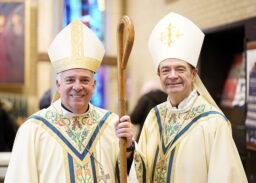
FLATLANDS — Michele Guerrier was 10 years old when the Rev. Martin Luther King Jr. was assassinated while standing on his hotel room balcony in Memphis in 1968. She had just recently immigrated to Prospect Heights from Haiti and was faced with, for the first time, the reality of racism in the United States.
It was in honor of King’s legacy that she came to St. Thomas Aquinas Church on Jan. 15 for a celebratory Martin Luther King Jr. Mass organized by the Diocese of Brooklyn.
“I want to be part of Dr. Martin Luther King’s dream. I want to see it come to fruition in my community and in the world,” she said.
In partnership with the diocese’s Vicariate Office of Black Catholic Concerns, the Mass was celebrated by Archbishop Nelson Pérez of Philadelphia.
Archbishop Pérez is an outspoken advocate for equality, known for his pastoral letter on racial healing titled “We Are One Body.” It describes the great sin of racism, how it “denies our divine worth and violates the essence of our faith,” and how society must be built with a commitment to eradicating such hatred.
“It’s probably one of the most powerful letters written by the bishops of this country,” said Guerrier, a Lady of St. Peter Claver. “I’ve read it so many times.”
During the homily, the archbishop focused on one question, which he posed to the congregation of more than 200 people: What would Martin Luther King Jr. think of the country today, as it came to a halt for a federal holiday in his name?
“It’s a wonderful day for the country to look back at what wasn’t right and what Dr. King certainly felt called deep in his heart to make right, and how he set us on the right path. But the path is not done yet. We still got some walking to do,” Archbishop Pérez told The Tablet.
Legislation designating the third Monday of January as Martin Luther King Jr. Day was signed by then-President Ronald Reagan in 1983, and the first federal King holiday was three years later. This year, the holiday falls on what would have been his 95th birthday.
Bishop Robert Brennan joined his “longtime friend and brother” Archbishop Pérez in celebrating Martin Luther King’s legacy. Remembrance is “part of our DNA” as Catholics, he said, adding that it provides the encouragement to preserve the memory of Martin Luther King Jr. and sustains the efforts in continuing his work.
This responsibility, in part, falls upon the younger generation, noted the bishop, who applauded the Youth Leader Ambassadors who helped serve in the celebration as lectors and altar servers.
“Basically, the younger people have received an inheritance. They’ve received a gift from a prior generation and now they carry that dream, and they carry it into the next generation,” Bishop Brennan said.
Emmanuel Okurenjoku, 15, was among those Youth Leader Ambassadors. He traveled from his home parish of St. Bonaventure-St. Benedict the Moor to participate in this special event. The teen said “any day I can go to church is good,” but he was particularly thankful for the opportunity to help Archbishop Pérez and Bishop Brennan honor the world-changing civil rights leader.
“Dr. King didn’t do it for the glory, or to be known,” Emmanuel said. “He did it because of the importance of racial equality. That’s something we should all have on our minds.”
